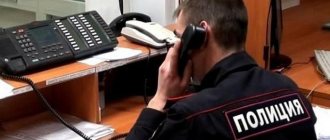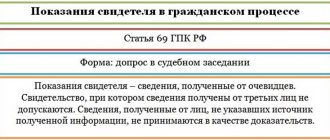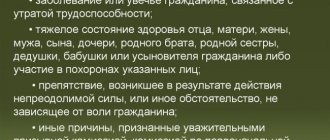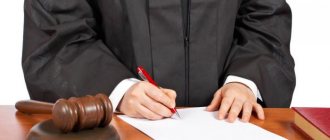We present a sample application to summon witnesses to court, taking into account recent changes in legislation.
Witness testimony is one of the pieces of evidence in a civil case. Often used in family matters, housing and labor disputes. A request to summon witnesses to court can be submitted either orally or in writing. If such a request to the court is prepared in advance, it is more convenient to write an application to call witnesses according to the provided sample. So that it is guaranteed to be considered and satisfied. However, situations may arise during a court hearing when witnesses need to be called suddenly. Then such a request can be made orally.
Who is a witness
A witness can be any person who has personal knowledge of some event or some significant circumstances of the case. A witness can either be a direct eyewitness to an event or learn about it from other sources. He must tell the court how he knows about the events he is telling. If a witness does not provide the source of his knowledge, his testimony will not be accepted as evidence.
A witness may know the participants in the court session personally, be a relative of one of them, or not know them at all. This does not in any way affect the ability to be a witness in a civil case. The main criterion in this case is the ability of the witness to convey to the court in an accessible and understandable form the information known to him. In this context, it is possible to interview, for example, minor children or persons suffering from a mental disorder who can speak and coherently present information known to them.
Who can't be a witness
The law (Article 69 of the Code of Civil Procedure of the Russian Federation) establishes strict restrictions on persons who do not have the right to testify in court.
Such persons include defenders and representatives - in relation to information that became known to them in connection with the exercise of these powers; judges - on issues discussed in the deliberation room; the clergy - about the content of the confession, the arbitrator - about the circumstances during the arbitration proceedings.
In addition, some individuals have the right to refuse to testify against certain individuals. These are close relatives of the persons involved in the case - against such relatives. And also, deputies and human rights commissioners - about information that became known in the course of exercising their powers.
Providing legal assistance to a witness by a lawyer
It’s not uncommon for us to hear from a television screen or see on the pages of printed materials a hero’s phrase that “...he intends to speak only in the presence of his lawyer.” The legal culture of contacting a personal (personal) lawyer has not yet been formed in Russia, but there are no longer isolated cases when citizens, not being subjects of criminal prosecution, resort to the help of defense lawyers when called for questioning as a witness or to give explanations. Such legal assistance from a defender received an informal name in the legal community - “Witness Lawyer.”
Legal grounds for a lawyer to assist a witness or what law provides for the possibility of inviting a lawyer?
The official legal basis for a lawyer to provide legal assistance to a witness is the provision of paragraph 6 of part 4 of article 65 of the Criminal Procedure Code of the Russian Federation. This provision of the law includes among the rights of a witness the possibility of him appearing for questioning before the investigator together with a lawyer.
The existence of this norm as stated does not at all mean that only the person called as a witness has the right to a lawyer, and only if he is called by the investigator. A witness can also be called by: an investigator, a local police officer, another police officer, an investigator, the head of an inquiry department or an investigative body, a tax inspector, a prosecutor and a court. When summoned for questioning by the above-mentioned persons, the witness also has the full and legal right to invite a lawyer to provide legal assistance.
In addition, it should be noted that a citizen has the right to legal assistance not only when called as a witness, but also when invited to give explanations, conduct an interview, participate in an investigative action as a victim, etc. These rights for a citizen are secured by Resolution of the Constitutional Court of the Russian Federation No. 11-P of June 27, 2000, which guaranteed legal assistance from a lawyer in all cases when the rights and freedoms of a citizen are significantly affected or may be affected by procedural actions and measures related to criminal prosecution.
Guided by this Resolution, a citizen has the right to resort to the assistance of a defense lawyer in other cases, for example:
- during a search at his place of residence, even if criminal prosecution is carried out against an outsider;
- when providing samples of handwriting, voice, biological substances, etc. for subsequent expert research;
- in any other cases related to criminal proceedings.
The procedure for inviting a lawyer or what should I do with the subpoena served?
If you have received a subpoena for questioning as a witness and you wish to use legal assistance, you must immediately take steps to invite an appropriate specialist. We recommend that you use the services of a lawyer who has a narrow specialized specialization, namely, contact a criminal lawyer. In addition, depending on which department employee is calling you, it would be rational to invite the appropriate specialized specialist, for example, an economic crime lawyer, a customs lawyer, a computer crime lawyer, etc.
From the contents of the received summons you can find out who is inviting you for questioning, to which authorized body and for what criminal case (reason). Based on this information, an experienced lawyer will be able to advise you on why you are being summoned for questioning. It will not be superfluous if you call the initiator of the interrogation at the contact number indicated in the subpoena and ask why you have been summoned to carry out investigative actions. As a rule, investigators and detectives report the reasons for the call, but at the same time, refusal to provide such information will not constitute a violation of the law. There is no doubt that the information received about the subject of the summons for interrogation, together with your explanations, will allow the lawyer to prepare you for the upcoming interrogation and develop a procedural line to protect your interests.
To the above, it should be added that the choice of a lawyer must be carried out in compliance with certain criteria .
A competent and competent defense attorney will definitely invite you to a preliminary oral consultation, during which he will formulate a line of conduct (defense) for you during interrogation. During the consultation, the lawyer will definitely study the documentation you have and may ask you to invite other potential witnesses for a conversation. This measure will allow you to eliminate possible unintentional discrepancies in testimony that will not be used against your interests.
An integral element of preparing for the upcoming interrogation is an explanation of your procedural rights as a witness, determining patterns of behavior in a particular development of events (interrogation), as well as your psychological preparation for the upcoming interrogation.
The formalization of the lawyer’s authority to defend you is confirmed by the issuance of a warrant, which, in turn, is issued on the basis of an agreement on the provision of legal assistance concluded with the lawyer.
The powers of a lawyer during interrogation or what will a lawyer do?
The powers of the witness's lawyer are quite extensive.
Thus, when representing the interests of a witness in criminal proceedings, a lawyer has the right to:
- give the witness brief consultations during the interrogation in the presence of the investigator;
- ask questions to the interrogated person with the permission of the interrogating person (it should be noted that the investigator can divert the defense lawyer’s questions, but in this case he is obliged to enter the deferred questions into the appropriate protocol);
- make written comments regarding the correctness and completeness of the entries in the investigative protocol;
- at the end of the interrogation, make statements about violations of the rights and legitimate interests of the witness (these statements must also be included in the interrogation protocol).
In other words, a lawyer is literally called upon to act as a legal shield against the potential threat of unfounded criminal prosecution of a witness, to prevent unlawful psychological influence or unacceptable investigative methods on him, and also to become an independent legal consultant for his client.
If you need procedural protection and assistance when summoned for questioning, or to receive immediate and detailed advice on the issues raised in this publication, please contact the Domkiny and Partners Law Office by phone: (495) 646-86-11.
The professional duty of our lawyers is to provide competent assistance to the witness when interacting with representatives of law enforcement agencies, ensuring full compliance with the law and guaranteed protection of the client’s interests. You can learn more about the legal services offered by following the link – “Lawyer for a witness”.
We bring to your attention a methodological guide prepared by our lawyers - “If you are called in for questioning”, with the help of which you can always resort to the correct algorithm of behavior when called in for questioning and independently ensure the protection of your interests.
Contents of the petition to call a witness
Any petition or application to call a witness must contain information that is mandatory. In their absence, the court will not grant the petition. It does not matter whether the request to call witnesses is made orally or in writing. This information must be present.
Firstly, in the application to call a witness it is necessary to indicate what circumstances this witness will confirm to the court. The specified circumstances must be of significant importance for the case (Article 56 of the Code of Civil Procedure of the Russian Federation) and relate to the burden of proof of the person declaring to call a witness.
Secondly, the application must indicate the full last name, first name and patronymic of the witness, his address of residence.
Rights and responsibilities of a witness in a criminal case in 2019: a brief educational program
In accordance with the norms of the current legislation of the Russian Federation, every witness in a criminal case has the right:
- Give evidence in your native language (Part 2 of Article 18 of the Code of Criminal Procedure of the Russian Federation);
- Submit petitions (part 1 of article 119 of the Code of Criminal Procedure of the Russian Federation);
- Not to be subjected to humiliation of his honor, human dignity and danger to his life and/or health (Part 1 of Article 9 of the Code of Criminal Procedure of the Russian Federation);
- Not to be subjected to violence, torture or other cruel treatment (Part 2 of Article 9 of the Code of Criminal Procedure of the Russian Federation);
- Not to be interrogated during the day with a total duration of more than 8 hours (Part 3 of Article 187 of the Code of Criminal Procedure of the Russian Federation);
- Rest for 1 hour after interrogation lasting 4 hours (Part 2 of Article 187 of the Code of Criminal Procedure of the Russian Federation).
In this case, the witness is obliged:
- Do not evade appearing when summoned by an inquirer, investigator or to court (clause 1, part 6, article 56 of the Code of Criminal Procedure of the Russian Federation);
- Give truthful testimony (clause 2, part 6, article 56 of the Code of Criminal Procedure of the Russian Federation).
Resolution of an application to call witnesses
A request to call witnesses can be made at any time during the trial, up to and including the removal of the court to the deliberation room. However, it is better to do this while preparing the case for trial. In this case, the court will have enough time to find and call a witness. There will be more guarantees that the court will not refuse the petition.
The court puts the issue of calling a witness for discussion between the parties. Persons participating in the case have the right to express their opinions on the need to interrogate this witness. And about his possible interest in considering the case. They can also bring to the court other information that may affect the resolution of the application to call a witness and the assessment of his testimony.
The result of the resolution of the petition to call witnesses in any case will be confirmed by a court ruling. This definition will establish the procedural position of witnesses, the circumstances that will be confirmed by their testimony. Such a determination is not subject to appeal; one’s disagreement with the refusal can only be expressed in an appeal against the final court decision.
Participants in the process
The subject composition of participants in criminal proceedings changes from the moment the case is transferred to the court.
Thus, at the investigation stage, the participants in the process are:
- suspect (accused);
- defender of the suspect (accused);
- victim;
- representative (lawyer) of the victim;
- legal representative of the suspect (accused);
- legal representative of the victim.
At the stage of judicial consideration, the prosecutor (prosecutor) joins the participants in the criminal case.
As part of the investigation and consideration of a criminal case, all of the above categories have the right to file various petitions, including petitions for the questioning of witnesses, provided that the testimony of these witnesses will be relevant to a specific criminal case or to the identity of the suspect, accused or victim.
How many witnesses to call to court?
Participants in civil proceedings often ask about the number of witnesses who need to be called to court. For some reason, it is believed among ordinary people that it is better to call as many witnesses as possible, who will tell everything in detail, describe all the relationships between the parties and tell the court about their experiences. It must be admitted that this is a mistaken opinion.
As a rule, for each circumstance relevant to the case, the testimony of one witness is sufficient. In simple cases, it is enough to limit the number of witnesses called to two or three citizens. In this way, we will protect ourselves from the fact that one witness may not come or give confusing and contradictory testimony. It should be borne in mind that speaking in court is a rather exciting procedure that causes stress. Therefore, overly susceptible citizens should be called in only in extreme cases.









